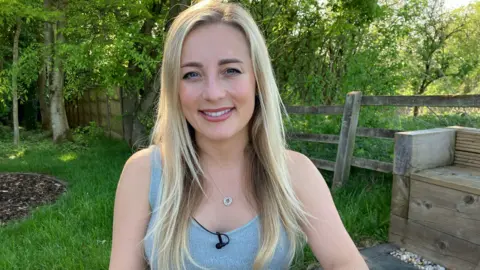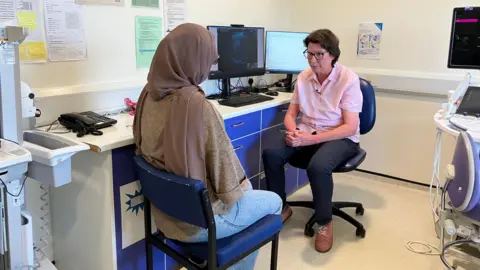Big baby trial gives pregnant women more choice
 BBC
BBCWomen pregnant with larger babies have been given the option to choose how and when to give birth in a bid to lessen the risk of injury to the child.
The "big baby" trial aimed to find out if starting labour earlier than 38 weeks made it less likely for infants who appeared large in the womb to be born with shoulder dystocia, where the shoulder becomes stuck during delivery.
Study findings from between 2018 and 2022 showed giving birth a week to 10 days earlier reduced the risk, researchers said.
It is hoped the data from the £2.5m Coventry-based trial will give doctors and midwives more confidence in facilitating natural births.
Coventry nurse Eve Morgan took part in the study 2018 after monitoring found her baby could reach 9lb (4kg).
Ms Morgan, who developed gestational diabetes when she was pregnant, had a cervical sweep to help bring on her choice of a natural labour.
As a result, she safely delivered her 7lbs 8oz boy (3.4kg) 10 days early.
"They said [the] baby grows so much in the last kind of week or so," she said. "I'm quite petite myself. They said he would have been big for me."
The trial was led by Siobhan Quenby, a professor of obstetrics at the University of Warwick and consultant at University Hospitals Coventry and Warwickshire (UHCW) NHS Trust, in partnership with the Perinatal Institute, Birmingham.
Results were gathered from 2,893 women in 106 hospitals in the UK, who consented to be randomly allocated to induction or standard delivery.
What is shoulder dystocia?
Shoulder dystocia occurs in 1 in 150 vaginal deliveries, delaying birth and leading to possible complications, including a stretching in the nerves of the infant's neck.
The NHS says the condition occurs more often in bigger babies but there is uncertainty over how often.
It is estimated it could affect 1 in 25 women with a big baby who have a vaginal delivery.
Large babies are defined as those who weigh more than 90% of other babies the same age, the NHS said.

Prof Quenby said the trial findings empowered women to decide "how and when they want to deliver their baby".
Trial data crucially revealed babies did not suffer more harm if they were delivered later. It also showed earlier delivery reduced the need for emergency Caesarean section and did not increase the risk of tearing.
"Whether you're induced at 38 weeks or whether you choose to wait for a natural labour, in both groups the baby's outcomes were the same," Prof Quenby said.
"Both groups had a risk of shoulder dystocia, it was actually slightly higher if you waited for labour naturally - but babies didn't do any worse if you wait for labour naturally."
She added all the babies were born in an NHS hospital, where staff were trained on delivering natural births.

Komal Mehmood, from Coventry, is 38-weeks pregnant with her second child, which is measuring as large.
She said she found the results of the trial helpful when deciding her birth plan.
"I mean it's a natural process at the end of the day," she said. "I understand the baby's big, but I'm confident that waiting for a normal birth shouldn't be a problem."
Asked if the data had offered her reassurance she said: "Definitely it does."
The trial was funded by the National Institute for Health and Care Research and the results published in the medical journal, The Lancet.
Follow BBC Coventry & Warwickshire on BBC Sounds, Facebook, X and Instagram.
